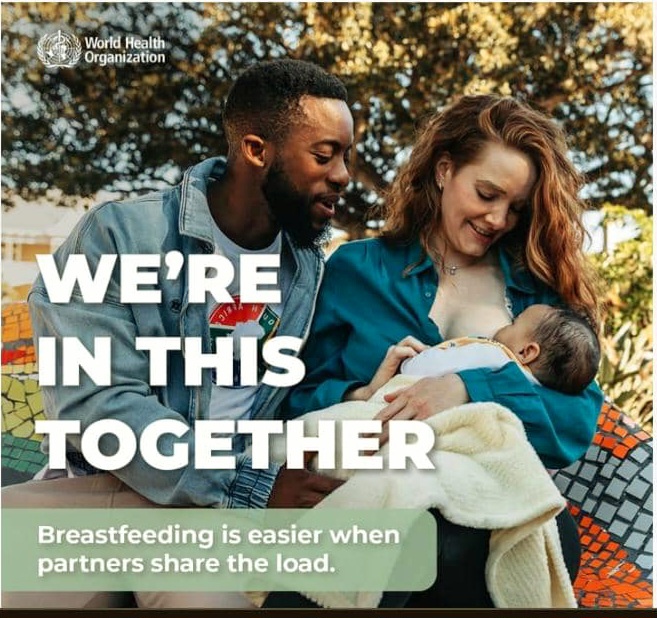2024 World Breastfeeding: The empowering tale of “Mama Twins” and nursing mothers
As we celebrate World Breastfeeding Week, we recognize the transformative power of exclusive breastfeeding in shaping a child’s future. This journey, though led by mothers, is a collective responsibility that relies on the pivotal support of fathers, husbands, and the broader community.
The supportive roles of fathers and husbands can significantly impact the success of exclusive breastfeeding, bridging the gap between a healthy, thriving child and a poorly developed one.
In an era where concerns surround the cost, safety, nutritional value, and quality of baby foods, exclusive breastfeeding stands as a beacon of hope. In this special first person report on LightRay! Media by Elizabeth Oluwaseyi Jimoh, we navigate the journeys of mothers who choose exclusive breastfeeding.
As I reflect on my journey, I vividly recall a few years ago when my husband tried to convince me to break a vow I had made. I had committed to exclusively breastfeeding each of my children despite the challenges I faced.
My first experience was far from easy. After giving birth, the nurses kept a close watch on me for three days, refusing to discharge me because they believed my breast milk volume was insufficient to sustain my baby. The most challenging aspect was adjusting to the correct breastfeeding posture, which was uncomfortable for me at the time.

I remember holding my crying baby, struggling to squeeze out the little available breast milk into her eager mouth. Despite her hunger, I was ignorant of basic breastfeeding tips, and my nipples were not positioned correctly for her to suck comfortably. Thankfully, with the help of experienced family members and healthcare workers, I overcame this hurdle.
When my second child, a boy, arrived, my previous experience had made me a better mother. However, my baby boy had a higher demand for breast milk and applied greater force on my nipples, causing significant pain. This experience was quite different from the one I had with my first daughter.
The pain led my husband to ask, “Is it a must you embark on this exclusive breastfeeding plan?” I replied, “My baby boy is just four months old. Don’t worry, I will endure.” Despite the difficulty, I continued exclusive breastfeeding until the sixth month. What kept me going was the knowledge of the numerous benefits of exclusive breastfeeding, including complete nutrition for the infant, boosting the immune system, reducing the risk of infections, allergies, and chronic diseases, aiding postpartum recovery, and promoting bonding between mother and child.
The Need for Exclusive Breastfeeding
Unfortunately, UNICEF reveals that only 29% of mothers in Nigeria exclusively breastfeed their infants, compared to 70% in other African countries with high rates of controlled breastfeeding at one year. While every mother desires a strong and healthy child, this goal comes with challenges.

Exclusive breastfeeding for six months or breastfeeding for 23 months can be difficult for some mothers. Research shows that breast milk provides essential energy and nutrients during illness and reduces mortality among malnourished children. Optimal breastfeeding is so critical that it could save the lives of over 820,000 children under the age of five each year, yet many mothers are unaware of this fact.
The Dilemma of an Ignorant Lactating Mother
An encounter with “Mama Twins,” as she’s fondly called by her friends in the neighborhood, revealed how the joy of motherhood could be cut short or tainted when a child’s growth and development are stunted. Mama Twins narrated her experience:
“I gave birth to a set of twins, two boys, on the same day. However, one looked strong and healthy while the other appeared anaemic. I purposefully fed the one who appeared anaemic because his weight was below average, and he seemed fragile at birth.
“I was scared he might die, so I intentionally gave him enough breast milk at the expense of his other twin brother, who looked agile with a weight of about 3.5kg. Unfortunately, I discovered that after two years, the able-bodied child whom I thought was strong and fit couldn’t walk, while the child who was anemic at birth is now fit, walking, and running with his two feet.”
Mama Twins’ ordeal attests to the fact that some mothers are ignorant of the benefits of breastfeeding. She was deceived into believing that the good-looking 3.5kg baby would automatically grow without the needed breast milk, hence she gave more attention to the seemingly weak baby who later became sound due to sufficient breastfeeding.
What is exclusive breastfeeding?
Exclusive breastfeeding, as recommended by the World Health Organization (WHO), is the optimal way to feed infants for the first six months of life. After six months, the WHO recommends continued breastfeeding along with the introduction of appropriate complementary foods up to two years of age or beyond.
A medical expert based in the U.K. opined that “exclusive breastfeeding is the ideal food that lactating mothers should embrace because it contains the antibodies that support growth and development.”
Strategies to Adopt
“Lactating mothers need to prepare themselves ahead of this great task. They need to eat well before, during, and after the process of giving birth. Women in their prime or in their first experience of giving birth should be willing to receive help from elderly experienced household members,” the medical expert explained.

Meanwhile, a stay-at-home mother narrated how she could not breastfeed her baby within the first five hours because her nipples were not producing sufficient breast milk. “I was instructed by nurses in the mothers and child hospital to drink sufficient water and take food like pap, which I was not comfortable with. I wasn’t aware that I needed to get myself prepared ahead of this major task of breastfeeding,” she said.
Challenges of Exclusive Breastfeeding
Mrs. Adewole, who retired as a Matron from a government-owned hospital in Lagos, elucidated that ignorance and a mother’s unwillingness to learn have been major challenges. “Some lactating mothers are not ready to learn cogent and vital lessons from health workers. Vital topics, which include healthy tips on the care of the breast, a guide on a complete diet for sufficient breast milk, and how to handle breast defects (i.e., in cases where some nipples might not come out easily because some kinds are flat or just pointed) are ignored by most lactating mothers,” she said.
Poverty and the inability to afford a good diet, the presence of disease or infection in lactating mothers, might also reduce the volume of breast milk produced for the baby during breastfeeding. Lack of support from family members and partners are some barriers she also highlighted.
Way Forward
Addressing these numerous challenges necessitated the 2024 World Breastfeeding Week, themed “Closing the Gap: Breastfeeding Support for All.” This brings to the fore the need for collective responsibilities from family members, health workers, the religious community, government stakeholders, and the larger society. All and sundry are enjoined to embrace and support breastfeeding mothers through diverse and comprehensive measures aimed at ensuring that every child has the best start in life.
By building bridges of knowledge and support, we can help mothers overcome the challenges of exclusive breastfeeding and ensure that every child receives the vital nutrition they need to thrive.





Comments